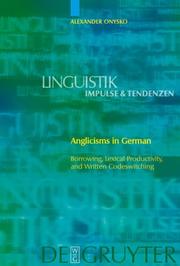| Listing 1 - 2 of 2 |
Sort by
|

ISSN: 16128702 ISBN: 9783110199468 3110199467 3110912171 Year: 2007 Volume: 23 Publisher: Berlin de Gruyter
Abstract | Keywords | Export | Availability | Bookmark
 Loading...
Loading...Choose an application
- Reference Manager
- EndNote
- RefWorks (Direct export to RefWorks)
The book offers a detailed account of English influence on German based on a large scale corpus analysis of the newsmagazine 'Der Spiegel'. The study is structured into three parts covering fundamental questions and as of yet unsolved and disputed issues in the domain of anglicism research and language contact. Part 1 discusses the terminological uncertainty in the field, puts forward a model of the influence of English on German, and proposes a principled classification of the term anglicism. Part 2 portrays the numerical impact of anglicisms in an extensive corpus and draws general conclusions about the overall quantitative influence of English on German. Part 3 conclusively investigates the integration of anglicisms in German across the various lexical and syntactic paradigms. Particular focus is attributed to the salient morphological features of gender, plural, genitive case, and to verbal and adjectival inflection. Furthermore, word formational processes are substantively analyzed including compounding, derivation, and peripheral types of word formation. A functional classification of written codeswitching concludes part 3, and the book closes with a brief outlook on future challenges of anglicism research. In its breadth and detailed manner of analysis, the study sets the current standards of research in the field.
Comparative linguistics --- English language --- German language --- Code switching (Linguistics) --- Foreign elements --- English. --- Influence on German. --- #KVHA:Anglicismen --- #KVHA:Linguïstiek; Duits --- Code switching (Linguistics). --- Ashkenazic German language --- Hochdeutsch --- Judaeo-German language (German) --- Judendeutsch language --- Judeo-German language (German) --- Jüdisch-Deutsch language --- Jüdischdeutsch language --- Germanic languages --- Language shift --- Switching (Linguistics) --- Bilingualism --- Linguistics --- Diglossia (Linguistics) --- Influence on German --- Foreign elements&delete& --- English --- German language - Foreign elements - English. --- English language - Influence on German. --- Script switching (Linguistics) --- Anglicism. --- Codeswitching. --- Corpus Linguistics. --- Language Contact. --- Word Formation.
Book
ISBN: 9783110223590 9783110223606 3110223600 3110223597 1282716409 9786612716409 Year: 2010 Publisher: Berlin ; New York : Mouton de Gruyter,
Abstract | Keywords | Export | Availability | Bookmark
 Loading...
Loading...Choose an application
- Reference Manager
- EndNote
- RefWorks (Direct export to RefWorks)
While cognitive linguistics has become established as a comprehensive research paradigm over the last three decades, it has so far hardly contributed to investigations into processes of lexical creation as traditionally captured in research on word formation. In light of this, the volume at hand is the first one to take a step ahead towards illuminating diverse aspects of word formation from cognitive perspectives. The book combines contributions to the 2nd International Cognitive Linguistics Conference of the German Cognitive Linguistics Association with a selection of invited papers by scholars working on issues of word formation and cognitive linguistics. This selection is guided by pluralism in both methodology and topics. Thus, some contributions are of a primarily theoretical nature discussing, for example, recombinance as a model of word formation and a taxonomy of word formation processes as construction types. Several articles address interface issues such as word formation and phrasal constructions, word formation and inflection, as well as phonology and word formational patterns. The majority of the studies focuses on individual types of word formation (compounding, affixation, and conversion), and they contribute to reframing our understanding of these processes. With a focus on mostly Germanic languages (Afrikaans, Dutch, English, German, Luxembourgish, and Norwegian), data-driven analyses include corpus linguistic investigations, elicited data, psycholinguistic experiments, and computational linguistic applications. A few contributions follow a mainly introspective path of reasoning based on the discussion of selected examples as in the analysis of creative compounds. Overall, the volume provides a rich array of topics emerging under the umbrella of cognitive linguistic thought and established patterns and processes of word formation. The various studies add to a yet marginal body of research in cognitive word formation and, thus, advance our awareness about the benefits of applying cognitive linguistic thoughts for investigating processes of lexical creation.
Grammar --- Grammar, Comparative and general --- Formation des mots --- Word formation. --- Morphology (Linguistics) --- Derivational morphology --- Word formation --- Morphology. --- Derivation --- Morphology --- Linguistics --- Philology --- Grammar, Comparative and general Morphology --- Cognitive Linguistics. --- Word Formation.
| Listing 1 - 2 of 2 |
Sort by
|

 Search
Search Feedback
Feedback About
About Help
Help News
News